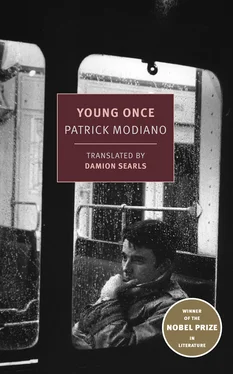“Well, now you have to earn your money. Two thousand francs, that’s a lot, you know. It’ll cost you.”
He looked through a folder on his desk without raising his eyes to her. Then he took a record out of its cover.
“Here. Now this is a talented girl. My last discovery. You want to listen?”
He put the record on the player.
“Stand in front of me. Take your clothes off.”
He said it in an unctuous tone, a smile fixed to his face, like someone posing for a photograph.
“She’s really talented, don’t you think? You wish you could sing like that? I’m going to get her on Eurovision next year…”
The mischievous voice of a little girl, smothered by electric guitars.
“I’ll have to fuck her too, one of these days,” Vietti said dreamily.
She was huddled on the sofa. He put his hand on Odile’s neck and pulled her face down to his waist. After that, the worst part of it for her was feeling the pressure of his manicured fingers in her hair.
•
The lights at the Café des Sports were off. She took a right down boulevard Gouvion-Saint-Cyr. The roll of bills Viette had given her was buried in one of the pockets of her raincoat: two thousand francs. He had said, looking snide, that she “cost a lot for a whore,” but that it wasn’t any problem for him, because he had “always liked expensive whores” for as long as he could remember.
She crossed avenue des Ternes and looked down toward where Bellune had killed himself. Suddenly she felt his absence with such force that it was as though she had plunged into the void. What would Bellune have thought about all this? He hadn’t believed very strongly in her future as a singer either, and near the end he was obviously preoccupied with other things. But she remembered her afternoon visits to his office, and the deck of his apartment where you felt like you were on the bridge of an ocean liner. It was Bellune who had taught her “La Chanson des rues,” a song dating from the time when he had first come to France. He had always shown kindness to her. His face, bent over the tape player while the reel turned in silence. And the words he used to say, in a soft voice, before leading her out of his office:
“What do you say we go downstairs, Odile?”
And Louis? What would he think if he knew what had just happened? He would never know. She needed the money. Bejardy’s fifteen hundred francs was not enough, and the only way the two of them could escape was by having money.
She had earned more money that night than Louis’s monthly salary, and she was sorry she hadn’t demanded more from that bastard with the manicured fingernails. She heard again the nightclub manager’s laugh, after he told her she wouldn’t be singing there anymore. She should have gotten some money out of him too.
The dream was over. She would not sing again. She had not succeeded in making people hear; her voice had not freed itself from the dust and the noise like the voice of the singer she had read about. She did not have the courage.
She reached rue Delaizement, with the garage at the end. The light on the second floor was on and Louis was asleep on the couch. The large album where he glued photographs of his father was sitting on the floor, next to an open volume of the bound issues of the sports magazine. He had glued an article at the top of the album page and she read it mechanically:
“… In the following stage, Memling finally had the upper hand over Gérardin, who started too cautiously, and overtook him at the 3,625 meter mark…”
She turned out the light and curled up against Louis.
LATER, when the two of them talked about the past — but they did so only on very rare occasions, mostly after the birth of their children — they were surprised to realize that the most decisive time in their lives had lasted barely seven months. It was true: Louis had left the army in December, they had met in early January…
In February, Brossier found them a new apartment. One day, when he came to see Louis at Porte Champerret, he was shocked by how tiny the room was and the stifling heat from the enormous radiator.
“You can’t stay here, old boy. Why didn’t you ever tell me about this?”
He knew about a “two bedroom” available just then, which he’d wanted to rent himself but then he had changed his mind, it was too far away from Cité Universitaire. It was at the start of rue Caulaincourt, on the other side of the iron bridge that crossed over Montmartre Cemetery. The rent? Reasonable, very reasonable. He would talk to Bejardy about it. Bejardy wouldn’t have the heart to leave Odile and Louis in such a miniscule, overheated attic.
They moved into the place on rue Caulaincourt the following month, and the apartment felt enormous. The main room was a studio. In one corner — the only things left from the artist who had lived there — there were a fan with huge blades and a semicircular bar. The bar’s chipped black lacquer was decorated with Chinese-inspired drawings like the ones on the shirt Brossier liked to wear at Cité. The windows looked out over southwest Paris.
Bejardy gave them a bed and an armchair with garnet-red upholstery, Brossier two cane chairs and a lamp. They even had a phone. And a well-furnished kitchen. When the concierge asked for their names to put on his list of renters, they said Mr. and Mrs. Memling, thinking he would feel better about a young married couple.
One night, they had their official housewarming party, as Brossier pompously put it. He said that Jacqueline Boivin, his fiancée, would unfortunately not be able to join them — from Cité Universitaire, rue Caulaincourt seemed like the other end of the world. You had to cross the Seine to get there, and the river was the frontier between two cities that had nothing to do with each other.
Bejardy came. Louis noticed a green and yellow ribbon on the lapel of his jacket.
“You’ve been decorated?” he asked.
“The Médaille militaire,” Bejardy said. “I earned it in Germany, under Marshal de Lattre. I was twenty-three. It’s the only good thing I’ve ever done in my life.”
He lowered his eyes, and it was clear he wanted to change the subject.
They had aperitifs in the studio. Then they had dinner nearby, at Chez Justin on rue Joseph de Maistre.
•
He no longer worked nights. From that point on, Bejardy entrusted him with “little tasks” to be carried out during the day, or else he would stay in the garage to greet visitors and answer the phone. These “little tasks” consisted in bringing letters to or from various addresses in Paris and the surrounding areas; Bejardy had told him he didn’t trust the mail. Often he would act as a chauffeur, driving Bejardy to his meetings in an old English car with a leather smell. His salary had been doubled, without Bejardy saying anything to explain why.
He felt vaguely uneasy. What was his “job” exactly? What “company” was he working for? And Bejardy? Why had he made him his right-hand man so quickly?
He rarely shared these doubts with Odile. On the contrary, his years of solitude, at boarding school and in the army, had given him the habit of not trusting anyone, concealing his worries. He forced himself to seem calm around her, and convinced her that his job was respectable. Bejardy’s protective attitude could be explained by the fact that he used to know his father. This was only a half lie: Bejardy had told him that he had been a cycling enthusiast in his youth and that he was delighted to be in a position to give Memling the cyclist’s son a job.
No, he couldn’t show the least unease around Odile. To do so would mean risking the fragile equilibrium of their life together. They no longer lived in a garret, after all, but in an apartment on rue Caulaincourt. And you could read, right there in black and white, on the list of renters stuck on the concierge’s window: “Mr. and Mrs. Memling.” Not bad for a twenty year old.
Читать дальше












